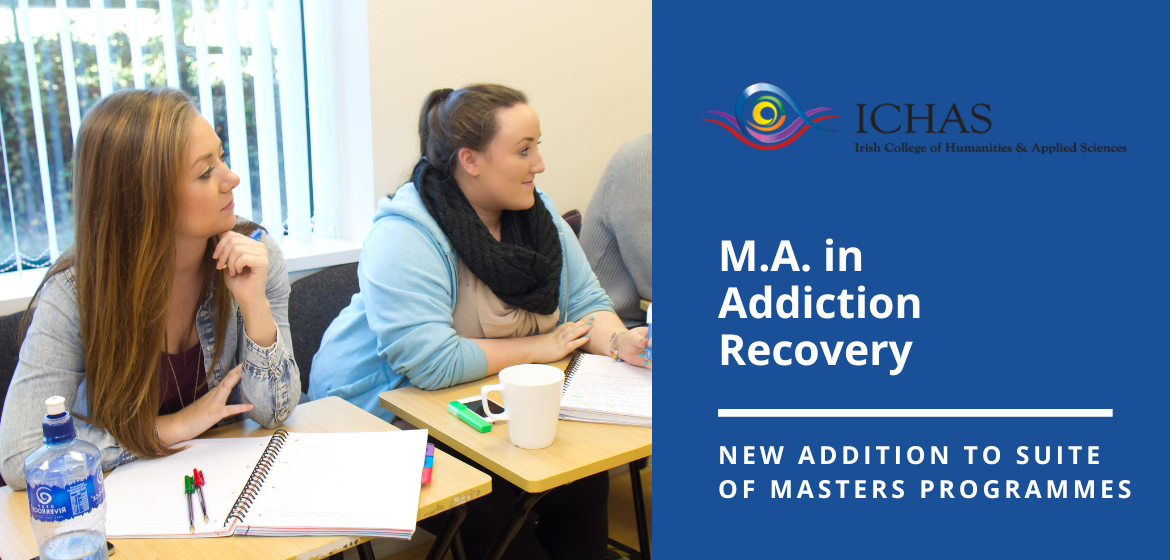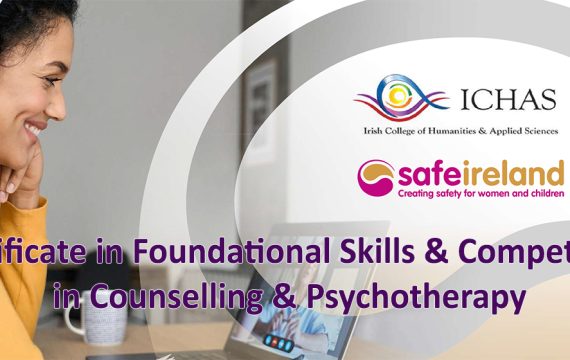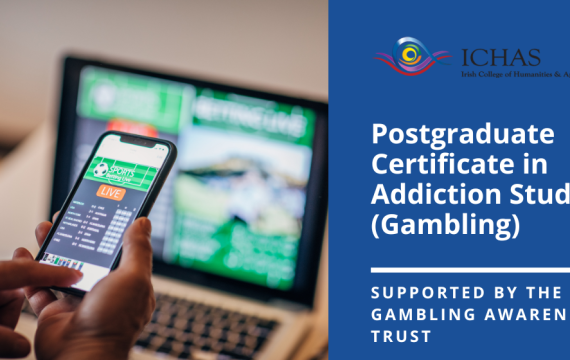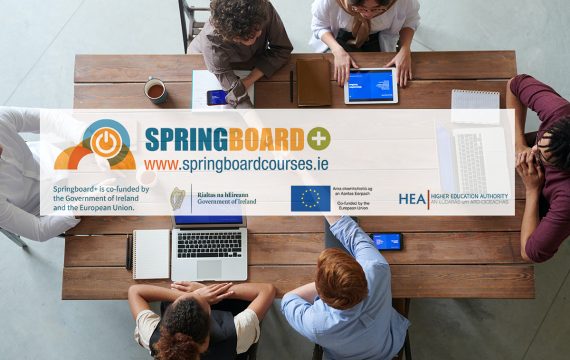
M.A. in Addiction Recovery
The programme is designed for graduates who wish to enhance their own professional skills and capacity and contribute to the wider community of addiction services through evidence-based knowledge and research. This programme enables learners to develop expertise in Addiction Recovery principles and practice. It is designed for graduates in health and human sciences and in particular graduates of counselling and psychotherapy related programmes as well as disciplines such as, nursing, social care, social work, psychology and programmes in cognate areas who wish to expand their knowledge and understanding of the human condition and the contribution of theoretical and applied perspectives at advanced level to addiction recovery.
In the following video, Prof. Denis Ryan goes through the key elements of the programme.
Who is this course for?
This course will be of interest to those who have responsibility for delivery and implementation of addiction services. The MA in Addiction Recovery is designed to provide high quality educational training to health and Social care practitioners who are driven by a desire to gain advanced knowledge of addiction recovery in order to act as leaders and agents for change across the range of ecological interactions. This implies a recognition of the special contribution made by professional addiction practitioners using a range of scientifically established paradigms and approaches to support recovery and the difference this can make to individuals, their families and communities. The programme envisages wellbeing holistically and systemically with recovery viewed at policy and preventative levels within the context of how public health models can most effectively enrich the lives of individuals and communities.
How can I complete this Course?
This course is available on a Full-Time basis where students complete their studies over three academic semesters (1 year) or on a Part Time basis over 5 academic semesters (2 years). This course is taught using a combination of classroom/skills based learning and blended learning technologies for theoretic elements of engagement. It thus allows the learner to access classes in person or online to allow for a better work/life/study balance.
Structure of Course:
The Programme is divided into 9 modules each of which has Educational Credits (ECTS) associated with them (please see a list of the individual module titles and the associated credits below). Each Module may also be taken on a standalone basis. It is also important to note that learners who complete 60 ECTS and who wish to exit the programme without completing their Dissertation may be awarded a Postgraduate Diploma in Addiction Counselling.
The course covers a range of subjects that are structured to develop competent professional practitioners. The subjects covered are designed to be both practical and theoretical as per the table below:
| Masters in Addiction Recovery | |
| Module Name | Credits |
| Understanding Addiction | 5 ECTS |
| Skills & Competencies in Addiction Counselling | 5 ECTS |
| Contemporary Evidence Based Interventions in Addiction Recovery | 10 ECTS |
| Research Methodologies & Design | 10 ECTS |
| Community Reinforcement Approach & Family aspects in Addiction | 10 ECTS |
| Comorbidity & Trauma Informed Care | 5 ECTS |
| The Recovery Model in Addiction | 5 ECTS |
| Elective | 10 ECTS |
| Dissertation | 30 ECTS |
| Total Credits | 90 ECTS |
| Elective (students must choose one of the following) | |
| Behavioural & Process Addictions | |
| Substance Use Disorders & The Recovery Model | |
| Gambling Addiction & The Recovery Model | |
| Neuropharmacological Aspects of Substance Use Disorders | |
Learners on the MA in Addiction Recovery are required to complete 90ECTS (as outlined above) over one academic year (Full Time) or two academic years (Part Time) and are required to take one elective module from the list above. further details on brief module aims can be found here.
This programme has been structured to provide learners who wish to study Addiction Recovery principles and practices through a more inter and transdisciplinary perspective. It also provides an opportunity to study material which addresses both the principles and ethos of recovery-orientated practices, as well as psychotherapeutic approaches to supporting individuals on a ‘wellness’ journey. The programme envisages wellbeing holistically and systemically with recovery viewed at policy and preventative levels within the context of how public health models can most effectively enrich the lives of individuals and communities.
What supports are available to learners?
At ICHAS, every lecturer and member of staff is committed to excellence in education and professional practice. Each Module has a Module Leader who works with students to enhance their learning and will provide formative and summative feedback throughout their studies. Each programme has a Programme Co-ordinator and in addition, you will have direct access to the Programme Leader and the Director of Graduate Studies.
The Dissertation and Practicum are central elements of the Masters programme. Each student will undertake these modules under the direction of an Academic and Practicum supervisor respectively for these modules who will be appointed by the College.
Who Awards My Qualification?
On successful completion of the programme, your qualification is awarded by Quality and Qualifications Ireland (QQI). QQI is one of the principal Irish awarding bodies for 3rd level education in Ireland and sets the standards for awards on the NFQ. Because this programme is both validated and awarded by QQI, the Award you receive is recognised in Ireland and internationally. See www.qqi.ie for further information.
Where Can I progress to on completion of the course?
On successful completion of the MA in Addiction Recovery, students will be qualified to access Level 10 Programmes on the National Framework of Qualifications (NFQ).
Entry Requirements & Selection Criteria
- A minimum of a Second Class Honours (2:2) award in a relevant Human Science Degree at Level 8 on the NFQ – or equivalent.
- Those who have completed other relevant education programmes or have relevant professional experience etc., where Recognised Prior Learning (RPL) and Acquired Prior Learning (APL) can be applied, may apply for admission to the programme by submission of programme content, qualification and assignments
equivalent to an appropriate Second Class Honours (2:2) award at Level 8. - The minimum English language proficiency requirement for this programme is B2+ in the Common European Framework of Reference for Languages which is equivalent to an IELTS score of 6.5.
- All applicants will be required to attend for interview to ascertain their suitability for the Programme.
- Garda Vetting is a requirement for all successful applicants.
If you have any queries in relation to this course then please contact the college on 061 216288 or email us on info@ichas.ie. A member of the Admissions team will be happy to assist you
The Masters in Addiction Recovery is targeted at those who wish to enhance their employability and career progression prospects in statutory, community and voluntary sectors and Addiction Service environments. It is targeted at learners seeking to critically evaluate institutionalised practices and values, and act as agents for challenge and change in their professional contexts. The programme will address the needs of graduates who wish to develop their professional competence in areas of Addiction Recovery principles through advanced study and research, develop personal and professional capacity and collaborative problem solving skills, underpinned by evidence-based practice and reflection.
The MA in Addiction Recovery has many distinctive features that make it one of the leading programmes of this type.
For Example;
- It meets the QQI Award Standards for Counselling and Psychotherapy in Ireland.
- This programme is part of a suite of programmes that have been validated by Quality and Qualifications Ireland (QQI), ensuring the quality of its teaching and assessment strategies, programme content and quality.
- It is delivered by lecturers who are experts in the fields of study.
- Recognised nationally and internationally. On completion, you will receive the Europass Diploma Supplement in addition to your degree parchment.
- It is recognised by professionally accreditation bodies within the Psychological Therapies Forum.
- It adopts a Flexible structure, meaning that students may study at a pace and duration that fits in with their lifestyle demands – students may study on a modular basis or spread the period of their studies over a timeframe that is agreed with the College.
- It focusses on interventions that have a proven evidence base in terms of effectiveness.
- It combines a well- balanced match of theory and practice.
- This course facilitates a progression route to PHD and professional doctorate level programmes.
- It facilitates access to higher-level education thus increasing employment opportunities for graduates in a range of different areas where addiction is problematic.
- It utilises blended learning approaches offering a flexible approach for all students through face to face and on-line learning.
This progrmme is offered on a full-time and part-time basis with a range of options around the payment of tuition fees, with monthly payment plans available to learners.
A central component of the ICHAS vision is the provision of flexible and affordable education for all.
EU/EEA fees
The tuition fees for the programme are 1 Year Full-Time €7,800 and 2 Year Part-Time €8,200 (this includes a 2% PEL levy). In addition, students who opt for monthly instalments will incur an extra fee of €150 to avail of this facility. All fees are fully protected under our Protection of Enrolled Learners’ Policy.
Non EU/EEA fees
For details on international fees and bursaries available, please click here
Protection of Enrolled Learners’ Policy. All QQI accredited programmes of education and training of 3 months or longer duration are covered by arrangements under section 65 (4) of the Qualifications and Quality Assurance (Education and Training) Act 2012 whereby, in the event of the provider ceasing to provide the programme for any reason, enrolled learners may transfer to a similar programme at another provider, or, in the event that this is not practicable, the fees most recently paid will be refunded.
Click to apply for this programme
Available at our Dublin and Limerick CampusesFeatured Courses

Safe Ireland-Certificate in Foundational Skills & Competence in Counselling & Psychotherapy
The Programme is designed for learners who wish to learn fundamental skills and competencies in counselling & psychotherapy practice.
FIND OUT MORE
Postgraduate Certificate in Addiction Studies (Gambling)
The programme specifically aims to increase practitioner awareness and enhance relevant skills and competencies to engage with those with Gambling Addiction and to support them in their journey towards recovery
FIND OUT MORE
Certificate in Work-Related Behaviour
In the contemporary professional landscape, understanding the psychological underpinnings of individuals and teams is not just an asset but a necessity for fostering a healthy, productive, and fulfilling work environment
FIND OUT MORE
























